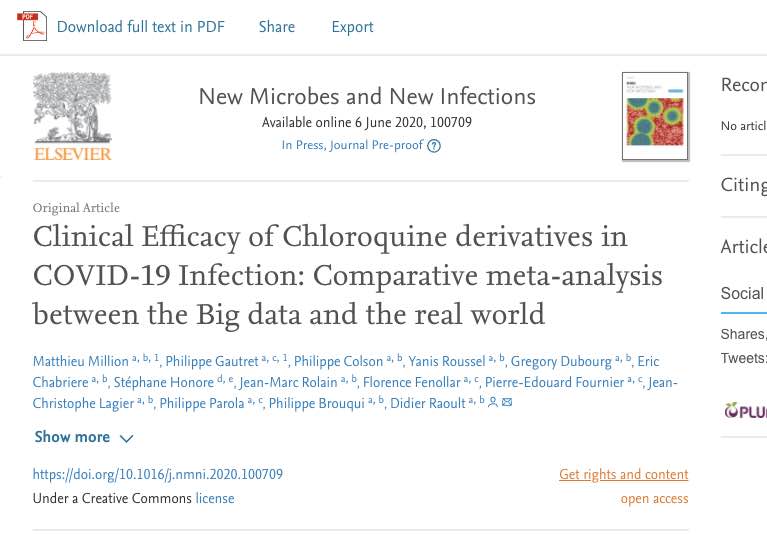Source: ScienceDirect | PDF of full Journal Pre-Print
Abstract
In the context of the current COVID-19 pandemic, we conducted a meta-analysis on the effects of chloroquine derivatives in patients, based on unpublished and published reports available publicly on the internet as of May, 27, 2020.
The keywords “hydroxychloroquine”, “chloroquine”, “coronavirus”, “COVID-19” and “SARS-Cov-2” were used in the PubMed, Google Scholar and Google search engines without any restrictions as to date or language.
Twenty studies were identified involving 105,040 patients (19,270 treated patients) from nine countries (Brazil, China, France, Iran, Saudi Arabia, South Korea, Spain, and USA).
Big data observational studies were associated with conflict of interest, lack of treatment dosage and duration, and absence of favorable outcome.
Big data observational studies were associated with conflict of interest, lack of treatment dosage and duration, and absence of favorable outcome.
Clinical studies were associated with favorable outcomes and details on therapy. Among clinical studies, three of four randomized controlled trials reported a significant favorable effect.
Among clinical studies, a significant favorable summary effect was observed for duration of cough (Odds ratio (OR), 0.19, p = .00003), duration of fever (0.11, p = .039), clinical cure (0.21, p = .0495), death (0.32, p = 4.1×10-6) and viral shedding (0.43, p = .031). A trend for a favorable effect was noted for the outcome “death and/or ICU transfer” (0.29, p = .069) with a point estimate remarkably similar to that observed for death (∼0.3).
In conclusion, a meta-analysis of publicly available clinical reports demonstrates that chloroquine derivatives are effective to improve clinical and virological outcomes but, more importantly, it reduces mortality by a factor of 3 in patients infected with COVID-19.
Big data are lacking basic treatment definitions and are linked to conflict of interest.
In conclusion, a meta-analysis of publicly available clinical reports demonstrates that chloroquine derivatives are effective to improve clinical and virological outcomes but, more importantly, it reduces mortality by a factor 3 in patients infected with COVID-19. Big data are lacking basic treatment definitions and are linked to conflict of interest.

